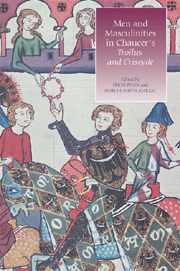Book contents
- Frontmatter
- Contents
- Contributors
- Abbreviations
- Introduction: The Myths of Masculinity in Chaucer's Troilus and Criseyde
- 1 “Beautiful as Troilus”: Richard II, Chaucer's Troilus, and Figures of (Un)Masculinity
- 2 The State of Exception and Sovereign Masculinity in Troilus and Criseyde
- 3 Revisiting Troilus's Faint
- 4 What Makes a Man? Troilus, Hector, and the Masculinities of Courtly love
- 5 Masculinity and Its Hydraulic Semiotics in Chaucer's Troilus and Criseyde
- 6 Masochism, Masculinity, and the Pleasures of Troilus
- 7 “The Dreams in Which I'm Dying”: Sublimation and Unstable Masculinities in Troilus and Criseyde
- 8 “A Mannes Game”: Criseyde's Masculinity in Troilus and Criseyde
- 9 Troilus's Gaze and the Collapse of Masculinity in Romance
- 10 Sutured Looks and Homoeroticism: Reading Troilus and Pandarus Cinematically
- 11 Being a Man in Piers Plowman and Troilus and Criseyde
- 12 “The Monstruosity in Love”: Sexual Division in Chaucer and Shakespeare
- Index
- CHAUCER STUDIES
6 - Masochism, Masculinity, and the Pleasures of Troilus
Published online by Cambridge University Press: 12 September 2012
- Frontmatter
- Contents
- Contributors
- Abbreviations
- Introduction: The Myths of Masculinity in Chaucer's Troilus and Criseyde
- 1 “Beautiful as Troilus”: Richard II, Chaucer's Troilus, and Figures of (Un)Masculinity
- 2 The State of Exception and Sovereign Masculinity in Troilus and Criseyde
- 3 Revisiting Troilus's Faint
- 4 What Makes a Man? Troilus, Hector, and the Masculinities of Courtly love
- 5 Masculinity and Its Hydraulic Semiotics in Chaucer's Troilus and Criseyde
- 6 Masochism, Masculinity, and the Pleasures of Troilus
- 7 “The Dreams in Which I'm Dying”: Sublimation and Unstable Masculinities in Troilus and Criseyde
- 8 “A Mannes Game”: Criseyde's Masculinity in Troilus and Criseyde
- 9 Troilus's Gaze and the Collapse of Masculinity in Romance
- 10 Sutured Looks and Homoeroticism: Reading Troilus and Pandarus Cinematically
- 11 Being a Man in Piers Plowman and Troilus and Criseyde
- 12 “The Monstruosity in Love”: Sexual Division in Chaucer and Shakespeare
- Index
- CHAUCER STUDIES
Summary
With a title that is simultaneously declarative and descriptive, one might think we would have a confident answer to the guiding question of this essay: what are the pleasures of Chaucer's Troilus and Criseyde? This question remains difficult to answer, for reasons that pertain to the poem's construction of Troilus's masculinity out of the fracturing experience of suffering. At its basic level of plot and character, the tale of an arrogant and sulky bachelor who wins the fleeting love of a morally inscrutable widow through the oily machinations of her lascivious uncle seems an unlikely source of literary pleasure. With its formulaic structure, featuring love's debilitating desire, its momentary reward, and its inevitable loss, Troilus and Criseyde seems almost deliberately unappealing. For instance, Gretchen Mieszkowski argues in her feminist analysis of the text that “Male Chaucerians may be surprised to learn that reading Troilus and Criseyde for the first time is almost invariably a disappointment for a woman.” Of course, there arises no inherent discrepancy between a pleasureless narrative and a pleasurable reading experience, since, as Roland Barthes observes, “The text of pleasure is not necessarily the text that recounts pleasures.” If the same could be said for depictions of pain, then we might readily agree that Troilus's suffering potentially provides a source of pleasure in the poem. Taking pleasure from another's pain, however, is often regarded as socially suspect and ethically corrupt.
- Type
- Chapter
- Information
- Publisher: Boydell & BrewerPrint publication year: 2008

